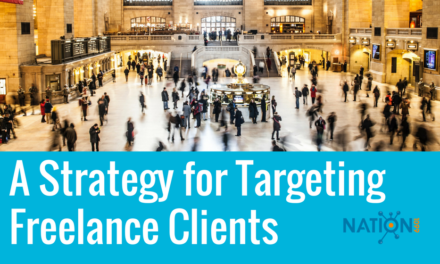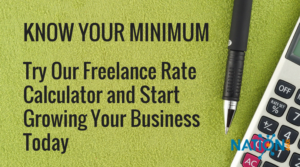Hi. The Nation1099 editors here. Our guest author has some really inspiring advice below about how to start a freelance business. But because you are interested in this subject, we put together a quick guide through the content on this site that will help you build your freelance career.
Don’t worry. Nothing for sale here. It’s just a tour through our essential articles and videos. If you’re just starting your freelance business, you’ll plenty in here to help.
Setting your freelance business strategy
How Do I Become a Professional Freelancer?
Video — Mitch Anthony On Building A Mission-Driven Freelance Brand
Video — Jayne Heggen On Pricing Strategy For Freelancers And Consultants
Video — More Clients or Better Clients? How To Shift Gears As A Freelancer
Running your freelance business
Worried About Scope Creep? Keep the Contract Front and Center
The Freelance Contract: How to Write an Effective Statement of Work
How To Be More Productive With Your Accountability Group
Conquer Freelance Taxes and Independent Contractor Tax Deductions
Best E-Learning Websites for Freelancers
How Do I Manage My Freelance Business Budget?
Marketing your freelance business
How To Make A Great Consulting Website
4 Steps To Creating a Clear Freelance Brand
19 Things To Do Right Now To Attract New Clients
How to work effectively with your freelance clients
How to Resolve a Client Dispute
Setting Up For Success At The Start of a New Project – The Initial Consultation
Earning more in your freelance business
Freelance Rate Calculator: Know Your Expenses To Know Your Minimum
2 Signs Your Freelance Fees Are Too Low
Getting the Freelance Rate You Deserve
Freelance career guides
We have a growing library of career guides for freelancers in different subject areas. These outline rates, where to find more support, how to market those services and paths to greater income.
Freelance Graphic Design Career Guide
Freelance Copywriter Career Guide
Freelance Web Developer Career Guide
Freelance Web Designer Career Guide
Independent Management Consultant Career Guide
Taking care of yourself
Finally, part of starting and running a freelance business is making sure that it works for you — particularly for your personal finances.
Freelance Finances: Manage Your Income Like A Thriving Artist
Health Insurance for Freelancers — The No-Nonsense Primer
How to Find a Mastermind Group for Freelancers . . . Or to Start and Run One Yourself
The SEP-IRA explained — Retirement Planning For the Solopreneur

Every freelance business starts with this one first step
From freelance animation to financial consulting, more business professionals are ditching the day job for the flexibility of a freelance lifestyle. Work from home is an attractive idea, but knowing how to do the work in your field is only half the requirement. The other half is knowing how to start a freelance business that will sustain you.
Put another way, if you are a freelance photographer, you aren’t just taking pictures that fulfill the creative brief. You are selling photography services and building all the marketing and management processes that go into succeeding.
Diving into the 1099 world can be liberating, but also intimidating. Starting a freelance business is a lot of work, but the best way to get up that steep learning curve is to start running.
1. Go after your first clients
You might be wondering: Shouldn’t the first step of starting a freelance business be to take a bunch of courses, build a branding mood board, develop a business strategy or order some fancy letterhead with your new logo?
In many cases, the thing that keeps people from starting a freelance business isn’t their skill set or the planning. It’s never believing they’re ready. They hold back from going after clients because they still want to polish their website, boost their confidence with another course, or fill out another version of the business model canvas.
The thing that keeps people from starting a freelance business isn’t their skill set or the planning. It’s never believing they’re ready.
Those are all important. So plan to set aside money from the first payment from your first client to pay for them. But get that first freelance client.
Start prospecting now, even while you’re getting the rest of your business in place. Those hours you spent coming up with the perfect tagline for your business aren’t going to pay the bills.
Your first step is to get one client. Change that one thing, and you change everything.
If it sounds like a reckless way to start a freelance business, think of it this way: Nothing will make you prioritize learning about freelance contracts and scopes of work faster than having a prospect asking you to email one for signature.
Ready to get your first clients? Try:
- Online freelancing job boards
- Reaching out directly to your ideal clients
- Independent consulting marketplaces
There, you started your own freelance business! That’s the one step.
Until you get that first client and get paid, you are what the tech world calls “pre-revenue.” Once your first invoice gets paid, you are a struggling startup.
Now that you know how to start a freelance business, it’s time to make it grow and thrive. You’ll need to take several other steps, starting with building your circle of prospective clients.
Build your network of freelance clients
Job boards are a great place to start looking for freelance gigs, but many of your best clients are going to come through your network. That’s because for the rates they’re willing to pay, they don’t want to risk working with just anybody. They want someone who comes recommended.
When you start connecting with others in your industry, you’ll begin to tap into a powerful referral network. Look for local networking events, big-name industry conferences, online communities, professional associations, neighborhood groups, and anywhere else you may come in contact either with people in your industry or potential clients.
The key to networking is to have a mindset of making friends, rather than selling your services. People want to work with (and refer business to) their friends — not a stranger who’s constantly shilling their business.
Make it a goal to reach out to a few new people every week for a Skype or coffee date. You never know where your next (or first) client might be referred from.
Get your legal, financial, and other business operations in order
Running a freelance business is more than just finding clients and getting paid. Think of your new business as one desk with many people sitting at it — legal, HR, bookkeeping, accounting, facilities management, training — except they’re all you. Among the first issues you’ll have to pay attention to are business operations such as licenses, taxes, and freelance health insurance.
Many freelancers start out as a sole proprietorship, but you may want to incorporate your business depending on how much income you’re bringing in, or if your specific industry requires it. Talk to a local accountant who works with consultants and freelancers to make sure you’re on the right track.
Open a business checking and savings account, and get in the habit of keeping your freelance finances separate from your personal finances. From day one is ideal, but it’s possible to unblend your personal and business accounts after you get started.
Save all your receipts to take deductions at tax time, make your quarterly payments on time, and be sure to set aside at least a third of every client check for taxes and to serve as a buffer in the (inevitable) lean times.
Again, it really pays to talk to an accountant here.
Cultivate your online presence
Because many of your clients will find you online first, your online presence needs to give them a sense of what you do and what it will be like to work with you.
You don’t need to start with all the bells and whistles, but you do need to have a basic website with information about your services and a nice-looking online portfolio. Make it official by purchasing a domain name, and getting an official business email for that domain. It gives you more professional feel, which will build trust with potential clients.
Take some time to polish up your LinkedIn account. All the same SEO principles that you would apply to your website (niche keywords, geolocation keywords) also apply on LinkedIn. LinkedIn is more than just a social networking sites for business professionals. It’s also a major search engine for people who are looking to hire freelancers. Make sure your profile is optimized so that you show up, especially in your local results and in your specific niche.
Refine your freelance niche
Pitching yourself as an all purpose freelance copywriter, photographer, software engineer, etc. probably won’t cut it anymore. Clients want to know that you understand their particular issues. That also allows you to compete on having the most expertise, so you don’t have to compete so much on having the lowest price. Having a niche is one great way to keep your freelance rates up.
You may be one of those lucky people who already has a specific niche based on your expertise or past experience. But if you don’t, it’s okay to build on your past experience to refine your niche as you go.
Niches can work in a couple of ways. You could provide a broad range of services in a specific industry (like marketing services for mortgage brokers), or a narrow service across a broad range of industries (like product explainer videos for ecommerce businesses).
As you become more specialized, your niche should get more specific. With every new freelance client and project that comes up, ask yourself how it leads you deeper into your niche. It may take time to get exactly what you want to be, but being mindful about the type of work you do will allow you to carve out a valuable niche for your business.
Learn voraciously
I put this step last not because it’s unimportant, but because too many new freelancers get hung up on what they don’t know and buy another online course rather than taking action. Unless your specific industry requires certification before you can start your business, commit to learning voraciously as you go rather than holding your freelance business hostage to never-ending research.
Learn about your craft, your industry, about marketing and developing your freelance business. Read blog posts, take online courses, study books, and continuously implement and iterate everything you learn in order to grow your business.
And that’s how to start a freelance business
As you get started, keep in mind that none of these activities are one-and-done. Keep iterating your prospecting process, your networking, your billing and invoicing system, your referral strategy, and your niche. And don’t forget to connect to the powerful network of indie professionals who can answer your questions and offer advice.
Have your own insight on how to start a freelance business? What tips would you give to newbies? Let us know in the comments.

Jessie Kwak author bio
Jessie Kwak is a freelance writer and novelist living in Portland, Oregon. She writes for B2B brands in educational technology, SaaS and related industries. You can learn more about her work at www.jlkwak.com.










